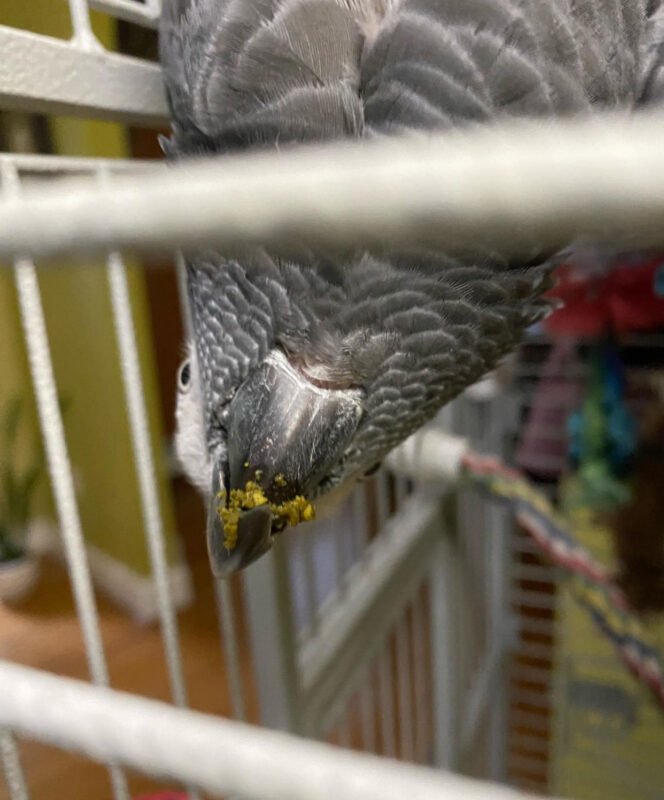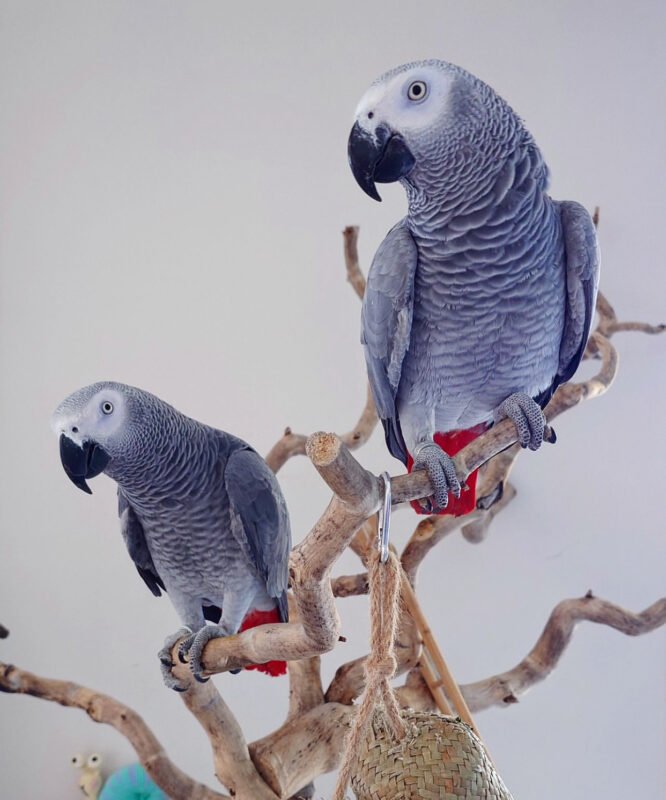What Do African Grey Parrots Eat?
African Grey Parrots are renowned for their intelligence, social behavior, and remarkable mimicking abilities. A key factor in maintaining their health and happiness is providing a balanced and nutritious diet. Understanding what African Grey Parrots eat is crucial for anyone who owns or is considering owning one of these magnificent birds. In this blog, we’ll explore the dietary needs of African Grey Parrots, including essential foods, supplements, and tips for ensuring they receive proper nutrition.
Natural Diet in the Wild
In their natural habitat, which spans the dense forests and savannas of West and Central Africa, African Grey Parrots have a varied diet. They forage for a wide range of foods, including:
1.Fruits: African Greys eat a variety of wild fruits, which provide essential vitamins and minerals.
2.Seeds: They consume seeds from numerous plants, which offer proteins and fats.
3.Nuts: Nuts are a vital source of healthy fats and proteins.
4.Leafy Vegetation: They nibble on leaves and other vegetation, adding fiber and nutrients to their diet.
5.Bark and Wood: Chewing on bark and wood helps in maintaining beak health and provides trace nutrients.
Diet in Captivity
In captivity, it’s essential to mimic the natural diet of African Grey Parrots as closely as possible to ensure they receive the necessary nutrients. A well-balanced diet for these parrots should include a mix of high-quality pellets, fresh fruits and vegetables, seeds, nuts, and occasional treats.
High-Quality Pellets
Pellets should form the foundation of an African Grey Parrot’s diet in captivity. They are specially formulated to provide a balanced mix of essential nutrients. Look for high-quality pellets that are free from artificial colors, flavors, and preservatives.
•Benefits: Pellets ensure that the parrot receives a consistent and balanced intake of vitamins, minerals, and proteins.
•Feeding Amount: Pellets should constitute about 60-70% of the parrot’s daily diet.
Fresh Fruits and Vegetables
Fresh fruits and vegetables are vital for providing essential vitamins, minerals, and fiber. They should make up about 20-25% of the parrot’s diet.
Fruits (in moderation due to sugar content):
•Apples (without seeds)
•Berries (strawberries, blueberries, raspberries)
•Bananas
•Grapes
•Oranges
•Mangoes
•Pineapple
Vegetables (a wide variety):
•Leafy Greens (spinach, kale, romaine lettuce)
•Carrots
•Peas
•Bell Peppers
•Broccoli
•Sweet Potatoes
•Zucchini
Preparation Tips:
•Wash all fruits and vegetables thoroughly to remove pesticides and contaminants.
•Cut them into manageable pieces.
•Remove any seeds or pits that can be toxic, such as apple seeds.
Seeds and Nuts
Seeds and nuts should be given in moderation as they are high in fat. They are beneficial for providing healthy fats and proteins.
Seeds:
•Sunflower Seeds (sparingly due to high fat content)
•Pumpkin Seeds
•Sesame Seeds
•Flaxseeds
Nuts (unsalted and unroasted):
What Do African Grey Parrots Eat?
•Almonds
•Walnuts
•Hazelnuts
•Pecans
•Cashews
Feeding Tips:
•Offer seeds and nuts as part of a balanced diet, not as the primary food source.
•Use them as training treats to encourage positive behavior.

Supplements
In some cases, dietary supplements may be necessary to ensure that African Grey Parrots receive all the essential nutrients. Always consult with an avian veterinarian before adding supplements to your parrot’s diet.
1.Calcium Supplements: African Greys require adequate calcium to prevent deficiencies that can lead to health issues like egg binding in females.
2.Vitamin Supplements: If the diet lacks diversity, vitamin supplements can help fill nutritional gaps.
3.Mineral Blocks: Providing mineral blocks in the cage allows the parrot to self-regulate their intake of essential minerals.
Water
Clean, fresh water should be available to your African Grey Parrot at all times. Change the water daily and clean the water dish regularly to prevent bacterial growth.
Foods to Avoid
Certain foods are toxic to African Grey Parrots and should be strictly avoided:
•Avocado
•Chocolate
•Caffeine
•Alcohol
•Onions and Garlic
•Rhubarb
•High-fat, high-salt, and high-sugar foods
•Certain fruit seeds and pits (e.g., apple seeds, cherry pits)
Feeding Tips and Best Practices
1.Variety: Offer a wide variety of foods to ensure a balanced intake of nutrients and to prevent boredom.
2.Observation: Monitor your parrot’s eating habits and preferences. Any sudden changes in appetite or behavior should be discussed with a veterinarian.
3.Regular Feeding Schedule: Establish a regular feeding schedule to maintain consistency and reduce stress for your parrot.
4.Enrichment: Use foraging toys and puzzles to make feeding time more engaging and mentally stimulating for your parrot.
5.Portion Control: Avoid overfeeding to prevent obesity and related health issues. Adjust portion sizes based on the bird’s activity level and overall health.
Conclusion
Providing a balanced and varied diet is crucial for the health and well-being of African Grey Parrots. By understanding their dietary needs and preferences, you can ensure that your parrot receives the essential nutrients for a long, happy, and healthy life. Remember, a well-fed parrot is a happy parrot, and a happy parrot makes for a delightful companion. Regular consultation with an avian veterinarian can further help in maintaining the optimal diet for your African Grey Parrot, ensuring they thrive in your care.

